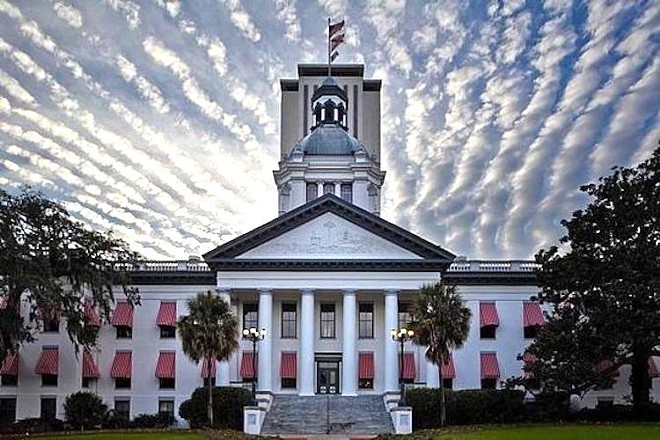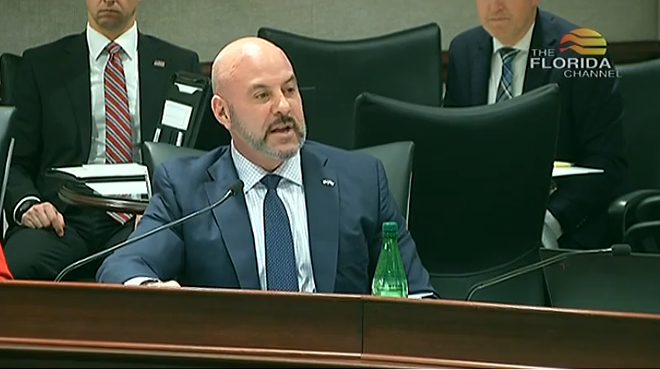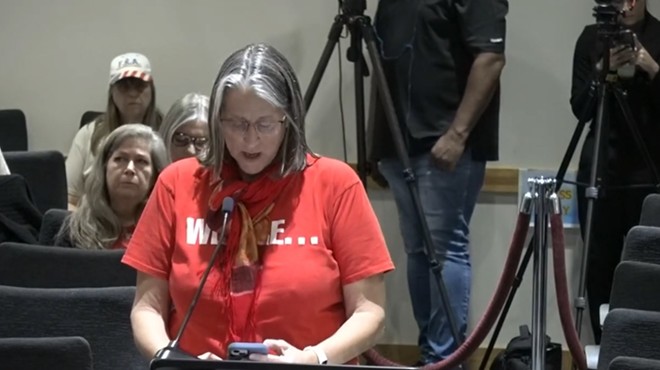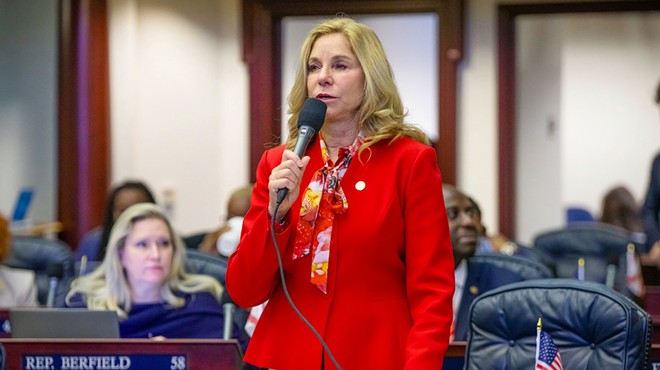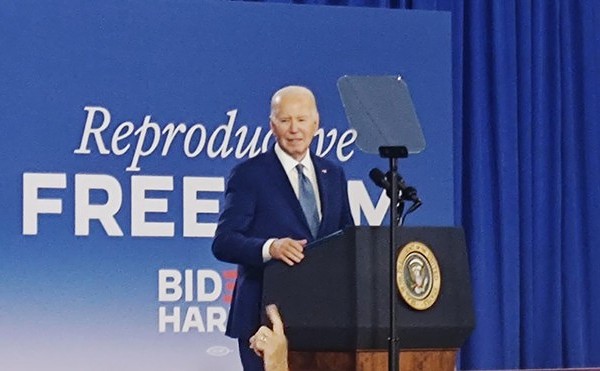A controversial bill that could make it harder for public employees to join unions, and make it easier for unions representing thousands of public employees to be dismantled, is quickly making its way through the Legislature, with its final passage likely secured before the end of session.
Just three Republican legislators — Sens. Joe Gruters, Jennifer Bradley and Corey Simon — joined Democrats in opposition, with Democratic Sen. Vic Torres (a former union cop and bus driver) absent for the vote. Similar legislation filed in the House (HB 1471) has also been streamlined for approval.
The proposal introduced this year, described as “glitch” legislation, is a follow-up to anti-union legislation approved last year by the state Legislature's Republican majority and Florida Gov. Ron DeSantis. (When legislatures pass bad laws, glitch legislation often follows. Recent examples in Florida include SB 154, designed to fix compliance difficulties in the law passed in the wake of the Surfside condo collapse; and SB 328, written to clarify inconsistencies in 2023's Live Local Act.)
All three Republican senators who voted down the union glitch bill on the chamber floor opposed that bill, too, which had been more than a decade in the making and is similar to other anti-union policies championed by right-wing politicians and special interest groups across the country.
Last year's law, targeting unions in the public sector, banned the decades-old practice of allowing union members to have their dues automatically deducted from their paychecks, similar to how health insurance or a 401(k) contribution might be deducted.It also established a minimum 60% membership threshold for unions — meaning, in order for a union to remain certified, at least 60% of employees eligible for union membership need to be dues-paying members, or risk having their union dismantled.
Under Florida’s right-to-work law, no employee can be compelled to join a union or to pay union dues.
Legislation filed this year, brought forward by the same Republican sponsors of last year's union bills, largely seeks to address grievances voiced by police and firefighter unions over the new regulations.
It also reflects recommended changes from the Public Employees Relations Commission (the state's regulating agency) and out-of-state organizations that have a well-documented history of peddling policies designed to weaken public sector union power.
The proposal offers both good news and bad news for unions. It could in part worsen administrative hurdles by adding to the laundry list of information unions are required to report to the state annually.
It could also unduly burden not just unions, but public employees, by mandating they fill out a new government-issued form in order to formally sign up as a union member.
Florida Sen. Blaise Ingoglia, owner of a residential construction company in the Spring Hill area, claimed he heard that signing up is basically as easy as signing the back of a napkin.
Much of the glitch legislation, touted as a fix to some procedural issues, is a gift to politically favored unions. Unions representing sworn law enforcement officers, firefighters, and correctional and probation officers were largely exempted from the new regulations approved last year — or they were supposed to be.
The Public Employees Relations Commission (PERC), led by three DeSantis appointees, has interpreted the vague language of last year’s law in such a way that it actually prevented some of the police and fire unions’ bargaining units from being exempted.
Part of the problem is that some of these unions' bargaining units (groups of workers represented by a union) represent not just police officers, but also civilian employees who aren't currently exempt. Police and fire unions even filed a complaint over the issue.
There’s also one part of the law that no union was exempted from: a requirement for unions to submit annual financial statements to the state that are audited by a certified public accountant.
Rocco Salvitori, vice president of the Florida Professional Firefighters, told lawmakers in January that this has been “extremely difficult” for some of their affiliates to comply with. The union represents 28,000 firefighters and paramedics across the state.
This is no surprise. Republican Sen. Joe Gruters, a CPA by trade, argued last year that this part of the law would be nearly impossible for some unions to comply with, due to the cost of an audit for unions with smaller budgets, and other complex issues related to the auditing process.
Public email communications obtained by Orlando Weekly show that the Florida Professional Firefighters union lobbied both bill sponsors as well as the Governor’s Office last fall to address problems with the new law. Steve Zona, president of the Florida State Fraternal Order of Police union, also emailed FOP's own draft language to Ingoglia, records show.
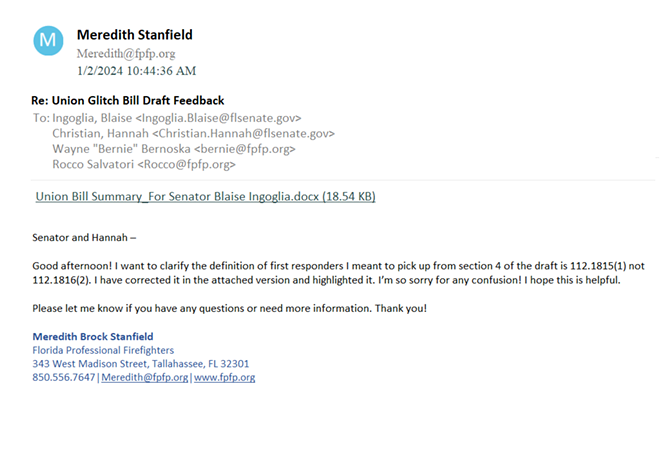
The two lawmakers got the memo. As a fix to some of the confusion tied to last year’s law, this year’s bill updates the auditing requirement that the firefighters union found “difficult” to comply with.
Under the bill, unions’ financial statements would no longer have to be audited by a CPA, but “prepared” by one. Union leaders confirmed to Orlando Weekly that, yes, this makes a difference (a positive one).
The proposal also adds additional exemptions for paramedics, 911 dispatchers and EMTs, and clarifies that bargaining units are exempt from the dues deduction and 60% membership threshold if the majority of employees they represent are those first responders.
When Democratic lawmakers tried to do the same last year, of course, Republicans rejected the idea. Then the police and firefighter unions complained, and they obliged.
The GOP bill sponsors, Sen. Blaise Ingoglia and Rep. Dean Black, have defended the law's exemptions by explaining that first responders belong to a “special risk” category of public employees under state statutes that differentiate them from others.
Critics contend it’s politically motivated, and ask why special risk employees are exempted if the legislation is really as “pro-employee” as the bill sponsors have said (Ingoglia slipped up one time last year when he first described it as “pro-employer” before quickly checking himself.)
The (red) elephant in the room is that cop and firefighter unions more often court and endorse Republican candidates for office. Teachers’ unions, on the other hand, tend to endorse Democrats.
Wayne “Bernie” Bernoska, president of Florida Professional Firefighters union, told Orlando Weekly in a statement that he “appreciated” both bill sponsors in the House and Senate for considering the union's feedback on the glitch bill.
Providing feedback during the legislative process, Bernoska said, helps “to ensure our members’ voices are heard.”
It was great to spend time with Governor DeSantis. Thank you for recognizing our Fire Service Award winners and for your advocacy and support of our men, women, and K9s on the front lines! 🚒🚑🐾 pic.twitter.com/4mSOajIHOY
— Florida Professional Firefighters (@FPF343) January 24, 2024
“Please get a backbone and vote no”
But not all unions feel quite as heard. The Florida AFL-CIO — a labor federation of roughly 500 local union affiliates — and the statewide teachers’ unions have, throughout session, testified against one big problem they have with the glitch bill—namely, the new membership forms and reporting requirements.
Under the proposed legislation, union members would need to fill out a new separate membership form issued by the state in order to confirm they want to be part of their union.
Unions already have their own membership forms under current law, which ask for more details than the state's proposed form.
Union members, including teachers, have testified that the new membership form is unnecessary and a naked attempt to unduly burden their union administration.
“What you're doing by that three-page form is adding red tape to people, not to unions,” said Dr. Ana Ciereszko, an adjunct professor at Miami-Dade College and legislative director for the United Faculty of Florida, during a House committee hearing.
Self-identified Republicans also characterized the bill as government overreach.
“The people that get impacted by this bill are saying, no, no, no, no, and again, no,” said Chris Pagel, a retired U.S. Army combat engineer and coach in Nassau County Public Schools. Pagel also serves as president of the Nassau Teachers Association.
“As a Republican, I can tell you, I am embarrassed and ashamed that we keep on voting yes, when your constituents are telling you, ‘No,’” Pagel continued during public testimony on the House bill last week. “Please get a backbone and vote no. ”
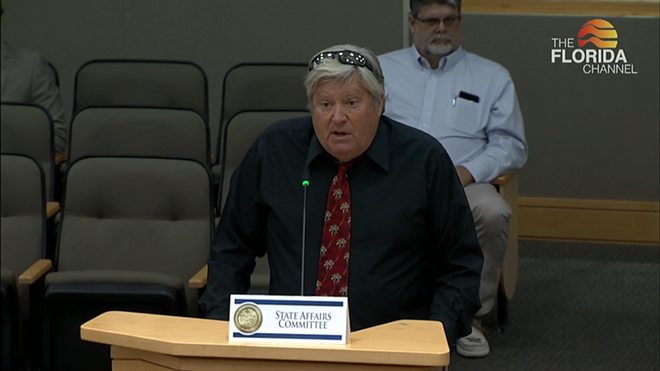
Patrick Strong, a teacher who described himself as a conservative Republican, said he doesn’t want to give the state more of his personal information.
“I trust my union with my membership information,” said Strong, who also spoke out against last year’s bill. “I don't want and don't trust a government membership form.”
Florida’s teachers’ unions — a political punching bag of the DeSantis administration — were better prepared than some other non-exempt unions to survive the new regulations.
Under a 2018 law approved by then-Gov. Rick Scott, teachers' unions were already required to maintain a membership density of at least 50%.
But for all other non-exempt public sector unions — representing municipal workers, transit workers and non-instructional school staff — this was novel.
And, for over 30 bargaining units that were unable to meet that 60% threshold, representing tens of thousands of municipal and state employees all in all, it was an unreachable target. Those unions were consequently — and quietly — decertified last month.
Some of these decertified unions were established decades ago, representing blue-collar workers in cities like Jacksonville — the folks who collect your trash or fix malfunctioning stoplights — alongside administrative and clerical workers in many of the state’s largest public universities.
Over 30,000 state employees alone, including employees in the state's dilapidated corrections system, have lost their union representation. And more could be next.
“As a Republican, I can tell you, I am embarrassed and ashamed that we keep on voting yes, when your constituents are telling you, ‘No’”
tweet this
The law offers unions the option to petition for a union election with the state to avoid decertification. But doing so requires the union to gather signatures from at least 30% of employees in support of maintaining the union.
For unions with literally thousands of employees — or unions that hadn’t been super organized to start with — that can be a heavy organizing lift. Not all unions have that kind of capacity, or the resources needed to pull that off.
Out-of-state influence
Both last year’s bill and this year’s glitch legislation have notably gained the backing of groups like the Koch-founded Americans for Prosperity and out-of-state think tanks like the Freedom Foundation, based in Washington, and the Mackinac Center, based in Michigan.
The Freedom Foundation, a self-proclaimed co-author of last year’s legislation, has limited political capital in their home state, which has been amenable to pro-union policy changes in recent years.
On the West Coast, the group has accomplished little in their mission of reducing public sector unions’ power. Their primary schtick these days is sending misleading mailers to union members across the country, urging them to “opt out” of their unions.
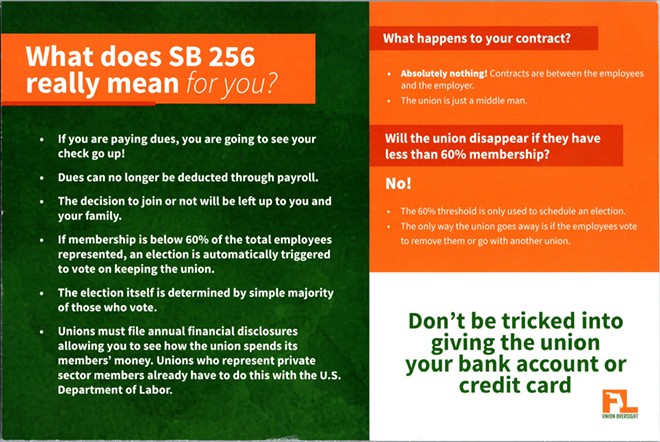
When Florida’s law passed last year, they celebrated, describing it as the “most aggressive state labor reform bill in decades.”
When Orlando Weekly reported last month that thousands of city and state employees had lost their unions — and the job protections granted to them under their union contracts — as a result of the law, the Freedom Foundation, again, celebrated — specifically quoting our reporting in their self-back-patting.
Emails obtained by Orlando Weekly through a public records request show that Christian Cámara of Chamber Consultants LLC, under contract with the Freedom Foundation, has been in communication with union bill sponsors since last fall, but not all of their proposals actually appear in the bills' language.
Tallahassee-based Cámara emailed draft legislation for the glitch bill to Ingoglia and Black’s legislative offices back in November. According to Cámara, the draft was a collaborative effort by both the Freedom Foundation and the Mackinac Center, a think tank founded in 1987 that has a decades-long record of attacking education unions and pushing other “free market” policies.
“Since we (Freedom Foundation) submitted proposed bill language to you last month, we’ve had extensive conversations with our friends at the Mackinac Center to develop language both our organizations can enthusiastically support,” Cámara wrote in an email to both bill sponsors on Nov. 9.
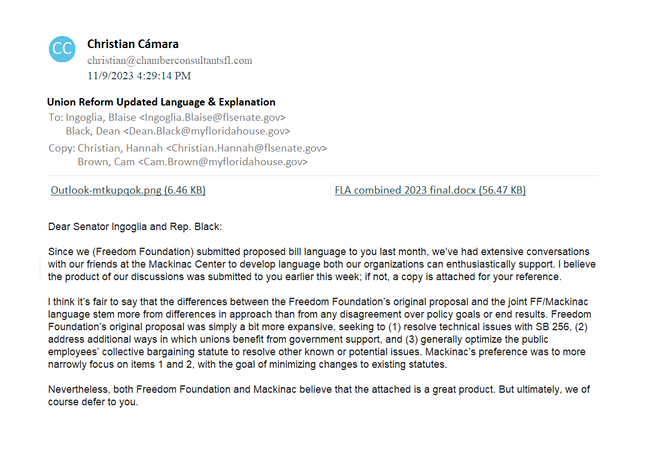
Both organizations are members of the State Policy Network, a billionaire-funded web of think tanks that collectively lobby states to adopt “market-friendly” policies.
Its affiliates in Florida, according to its website, include the James Madison Institute (which lobbied for last year’s anti-union law), ExcelinEd, and the Naples-based Foundation for Government Accountability — a think tank that also fought for last year’s law, and is currently working to roll back child labor law and make it harder for laid-off adults to secure unemployment benefits.Cámara, the Freedom Foundation lobbyist, also attended rule-making workshops organized by the Public Employees Relations Commission last year, according to meeting transcripts. So did Vinnie Vernuccio, a lobbyist for Workers for Opportunity — an initiative launched by the Mackinac Center in 2019.
Bernoska, the firefighters union president, told Orlando Weekly he wasn’t surprised the bill sponsors had consulted “various stakeholders” on the legislation, including the Freedom Foundation and Mackinac Center (although their actual stake in the issue — as out-of-state interest groups — is not immediately apparent).
Both organizations, Bernoska confirmed, were in “regular attendance” at PERC workshops, in addition to all major unions.
Florida Rep. Black, sponsor of the union legislation in the Florida House, did not respond to our request for comment on his collaboration with the Freedom Foundation and Mackinac Center on the legislation. In January, he described the glitch legislation to us in a phone call as “pro-worker.”
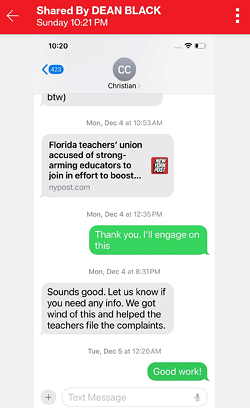
Sen. Ingoglia, whose office has historically not been responsive to our inquiries, accused Orlando Weekly of operating under “flawed liberal logic” after we asked about the influence of special interest groups.
“I filed the legislation because of suggestions by PERC to help address issues they encountered with regard to rulemaking following the passage of SB 256 last year,” Ingoglia shared over email.
“Your assertion that I solicited/accepted feedback from just these entities [Freedom Foundation, Mackinac Center] is as absurd as it is false,” Ingoglia added. “I also met with representatives and reviewed suggested language from SEIU [Service Employees International Union], AFL-CIO, the Teamsters, mass transit workers and others.”
Andrew Spar, president of the statewide teachers’ union — the Florida Education Association — told Orlando Weekly they, for their part, hadn’t been consulted at all in the drafting process, even though their affiliates represent over 150,000 public employees altogether, a huge chunk of the unionized public sector.
Since the bill was filed, the FEA has had one brief meeting each with the bill sponsors, Spar said. “They made it clear that they were not going to change this legislation,” he told us over the phone.
Rich Templin, director of public policy with the Florida AFL-CIO, said during public testimony on the legislation that they had certainly sought opportunities for collaboration with the bill sponsors. Specifically, they asked to suggest changes that would help fix basic procedural issues.
As written, Templin says it “doesn’t go far enough.”
“It doesn't address the many hurdles that have been identified, that have been agreed to by us, by the Public Employees Relations Commission, what have you,” Templin told the House State Affairs Committee.
The Public Employees Relations Commission, which was given a boost in funding specifically to implement last year’s law, has struggled to manage its new responsibilities with its limited resources.
“We're just starting to get to the point where we can order the [recertification] elections,” Don Rubottom, chair of PERC, told a Senate committee in January.
A number of unions, mostly teachers’ unions, filed petitions for recertification elections months ago, after submitting paperwork that showed they were below the newly mandated 60% membership threshold.
Those that have petitioned for an election to save their unions have not been decertified, or recertified for that matter. At this point, they’re in limbo.
PERC has also issued and reissued guidance on how unions must comply with last year’s law, since it was enacted last July and fully effective as of Oct. 1, 2023.
Changes in guidance have caused confusion in some local communities. The Volusia County school board, for instance, filed a notice with PERC in January, accusing the Volusia County teachers’ union of sharing illegally inflated membership numbers with the state.
Unions that submit false information to the state, under current law, can be subject to decertification.
The union’s president, Elizabeth Albert, has emphatically denied the school board’s accusation, and described the board’s move to contact the state as “mean-spirited”.
She told Orlando Weekly that the union followed guidance issued to them by PERC at the time of their registration renewal in October.
One school board member, formerly endorsed by the teachers' union, described this inconsistency in a recent board meeting as a “loophole” that Florida lawmakers were aiming to fix this year through the glitch legislation.
Sen. Ingoglia, the Senate bill sponsor, has admitted that one of the aims of the glitch bill is to fix “loopholes” he didn’t catch when he championed last year’s law.“This bill is before us because we did listen to the unions, and we understood that there was some issues with complying,” Ingoglia said during his bill’s first committee stop in January. He also “understood” that there were “some unions” that were “trying to game the system.”
“So we’ll be closing loopholes,” he said.
Workers for Opportunity, the Mackinac Center project, has similarly used the term “loophole” to describe the law’s vague directives.
In a legislative wish list emailed to Rep. Black in November, Workers for Opportunity listed a number of “recommended updates” to “close SB 256 loopholes.”
One of these recommendations included granting exemptions to bargaining units in which 60% or more of the employees represented are “uniformed personnel.”
This has made it into the glitch bill, without explicit use of the term “uniformed personnel.”
Another required union membership to be composed only of members who pay dues “in full.” This did not, or has not so far.
Both the Freedom Foundation and Workers for Opportunity have blasted some teachers’ unions over the last year for offering discounts on union dues as a way to recruit more members. Union dues typically account for 1-2% of a worker’s paycheck.
Vernuccio, the Workers for Opportunity lobbyist, complained about this during a PERC workshop in September. “I believe that the intent of the legislature was, you know, paying full dues as opposed to giving a discount of 50 cents,” he said.
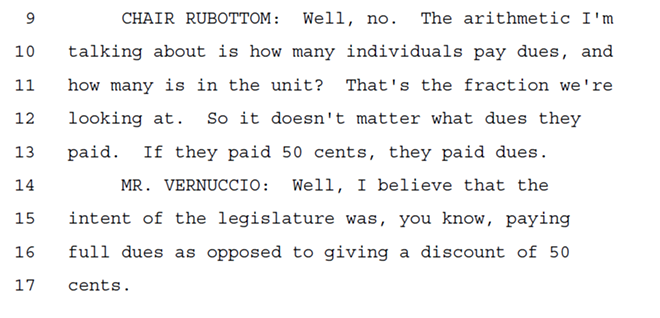
Currently, under PERC guidance, a union is required to report their membership numbers, and the number of employees eligible for membership, based on what those numbers were as of the 30th day immediately preceding the date the union’s registration is set to expire.
The Freedom Foundation doesn't like this calculation.
In draft bill language emailed to the bill sponsors, both the Freedom Foundation and Mackinac Center agreed on language that would require unions to report membership information based on information that’s current “as of the last business day of the second full calendar month preceding the date of its application for renewal of registration.”
The bill language, as filed, more greatly reflects PERC’s guidance than the think tanks’.
When Orlando Weekly caught up with Brown in January, he vaguely confirmed that they were trying to get “some amendments” to the bills.
He declined to clarify what exactly those plural amendments were. Emails show that Brown, who's based in Texas, flew into Tallahassee last fall to personally meet with both the bill sponsors and the Governor’s office.
Brown told Orlando Weekly that this glitch legislation was the only set of bills this session that they were keeping their eyes on.
It would be inaccurate to say that the Freedom Foundation and Mackinac Center wholly authored the legislation filed this year.
That's because a number of proposals they lobbied for don't show up in the bill language as filed or as amended in recent weeks.
The Freedom Foundation, for instance, originally lobbied the bill sponsors for a number of other suggested changes that do little to disguise their bias against unions.
The group, for example, suggested banning what they dub “captive audience meetings” by unions. That's a term commonly used to refer to anti-union meetings that employers, facing union drives, will often force employees to attend.
Under their proposed policy, emailed to the bill sponsors, public employers would be prohibited from “Requiring or coercing public employees to meet, communicate, listen to, or otherwise interact with an employee organization.”
In a one-page planning document, the Freedom Foundation described such meetings as “a high-pressured sales pitch” for unions.
Jennifer Sherer, a researcher with the Economic Policy Institute who’s produced reports on public sector union policy, told Orlando Weekly she didn’t know of any precedent for using the term “captive audience meeting” to describe meetings between union staff and public sector workers.“Mislabeling something along those lines as a ‘captive audience meeting’ is novel, to my knowledge, although maybe not surprising,” she said.
Several states have passed laws outlawing captive audience meetings organized by employers, which workers say can be coercive and manipulative.Florida is not one of them, but Washington state — the Freedom Foundation's home base — has seen such proposals introduced in the past. A bill introduced in the state this year has passed the state Senate, but has not yet passed the House.
Some other proposals from the Freedom Foundation are just petty.
The group suggested raising the filing fee for unions’ annual renewal registration paperwork from the current fee of $15 up to $90 to “adjust for inflation.”
“The original FF language updated the maximum filing fee PERC can charge unions for their annual registration. The maximum fee is currently set at $15 and has not been adjusted for inflation since the collective bargaining law was passed in 1975,” Cámara explained over email. “The maximum fee would be increased to $90 and PERC granted authority to adjust the fee for inflation thereafter.”
The group also sought to increase the financial penalty for illegal strikes by public employees, similarly to account for “inflation.” Under Florida law, public employees are strictly prohibited from striking.
Doing so anyway can lead to hefty fines for unions (up to $20,000 per calendar day), possible job termination, and the decertification of unions involved. Florida teachers who strike can also lose their teaching certificates.
There has been no legitimate strike threat by Florida’s public employees. But it has become a hot-button issue in other states.
Public school teachers in Massachusetts for instance — a state that also bans public sector strikes — recently walked out on strike earlier this year, illegally, shutting down schools for 11 days. The action secured a double-digit COLA increase for teachers, higher wages for classroom aides and more paid family leave. It also left the union facing over $600,000 in fines for the work stoppage.
The illegal strike demonstrated a continuation of the energy that took off with the “Red for Ed” movement in West Virginia in 2018, when roughly 20,000 teachers in the Republican-controlled state then similarly walked off the job.
Unlike Florida, West Virginia teachers do not have the legal right to collective bargaining, and teachers were warned that walking off the job for any length of time would be illegal. (The state officially banned teachers strikes through legislative action in 2021.)
The strike nonetheless inspired educators in a number of other states — such as Oklahoma and Arizona — to similarly walk off the job over issues such as pay and insufficient funding for schools.
The state of Florida itself was the site of the United States’ first-ever statewide teachers’ strike — over 25,000 educators strong — in 1968.

The Mackinac Center, however, was more inclined to “minimizing changes to existing statutes,” Cámara told the bill sponsors over email.
Thus, the Freedom Foundation's proposed changes to strike ramifications and filing fees were struck from the final recommendations the two groups presented.
“I think it’s fair to say that the differences between the Freedom Foundation’s original proposal and the joint FF/Mackinac language stem more from differences in approach than from any disagreement over policy goals or end results,” Cámara said.
Orlando Weekly requested comment from both Sen. Ingoglia and Rep. Black on why they (seemingly) decided not to ultimately file some of the bill language pushed by the think tanks.
Sen. Ingoglia did not address this question in his initial response to our inquiry, and Rep. Black never responded to our inquiry at all.
A billionaire's playground
The intrusion of out-of-state think tanks into Florida’s union policy landscape isn’t unique to Florida, according to Sherer, who heads the Economic Policy Institute’s State Worker Power Initiative.
Groups like the Freedom Foundation and the American Legislative Exchange Council, a corporate-funded generator of conservative model policies, “are constantly generating sort of new variations” on the theme of what would make it harder for public workers to join, find out about, and “have a functional, sustainable union that represents their interests,” said Sherer.
The private sector has taken notice, too. Business lobbying groups representing primarily private sector employers, such as the Chamber of Commerce, have also backed policies undermining public sector union power, even though they’re not directly affected.
There are a number of reasons why they might care. The United States’ public sector has a higher unionization rate (32.5%) than the private sector (6%), and union trends in one sector can have “spillover” effects on the other.
With attacks on the public sector, according to Sherer, “You can see broader spillover effects into the economy as a whole, in terms of suppression of workers’ wages and the erosion of job quality.”
Conversely, unions that achieve gains can also set standards for other workplaces, including those that are nonunion.
Templin, a longtime lobbyist for the Florida AFL-CIO, wasn’t surprised to hear of the Freedom Foundation’s involvement in the bills' drafting. He attended the same PERC hearings and workshops last year that the think tanks’ point people did.“Florida has become a billionaire's playground,” said Templin. “This is, you know, ground zero for these billionaire-funded think tanks, where these guys are literally going from state to state and messing with people's lives because they have nothing else to do but count their money.”
The Freedom Foundation, formerly known as the Evergreen Freedom Foundation, is a 501(c)3 nonprofit that’s not required to disclose its donors.
But federal tax records show the Bradley Foundation, a notorious financier of conservative causes, has been a generous donor in the past to the Freedom Foundation, as well as the Mackinac Center and the Naples-based Foundation for Government Accountability.
As the watchdog newsletter Seeking Rents points out, the Freedom Foundation —which reported $12.3 million in contributions in 2022 — has also received sizable donations from the Charles Koch Foundation ($250,000 in 2018), the foundation of billionaire Richard “Dick” Uihlein ($60,000 in 2021), the Adolph Coors Foundation ($45,000 in 2018 — yes, that Coors), and other wealthy GOP donors.
Special interest groups like the Freedom Foundation “seem to have more influence in the legislative process than the citizens of Florida,” said Spar, with the Florida Education Association. “And I think we see that play out over and over again.”
The glitch legislation passed the Florida Senate on Feb. 22, just one day after the Senate’s Republican majority rejected two proposed changes from fellow GOP Sen. Gruters that would have been a boon to unions and union members.
One of Gruters' amendments would have cut the language imposing a new, PERC-issued membership form. The other amendment would have tied unions’ registration renewal date — which currently varies by union — to the end of the union’s current contract.
Both failed to get enough support.
The Florida House, meanwhile, is set to take up the House version of the glitch legislation this week. Gov. DeSantis will have final approval if the legislation passes.
Have thoughts on this story? Share your feedback with reporter McKenna Schueler at [email protected].
Follow us: Apple News | Google News | NewsBreak | Reddit | Instagram | Facebook | Twitter | or sign up for our RSS Feed

